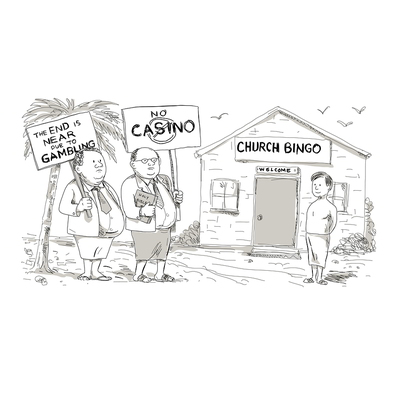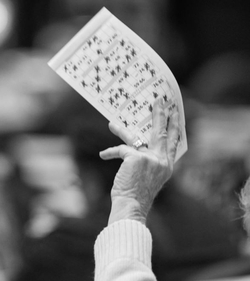 If you saw an advert in your local paper promoting an evening of poker or live sports betting held at the village church you might be a little taken aback. Religion and gambling aren’t the most obvious combination in the world, after all.
If you saw an advert in your local paper promoting an evening of poker or live sports betting held at the village church you might be a little taken aback. Religion and gambling aren’t the most obvious combination in the world, after all.
But if that same advert was promoting a night of bingo it would be far less likely to register as odd or contradictory. Bingo is a fairly common occurrence in church halls up and down the country.
Yet, bingo is legally classed as gambling, and anywhere that wants to provide bingo as an entertainment service needs to acquire the appropriate license; so do churches fall into this category, and if so, what is the story here?
The Relationship Between the Church & Bingo
 Churches are forever needing to raise money to repair the roof, fix the organ, or to send the Sunday school kids on an educational weekend, etc. Church fairs are not uncommon in this country with bake sales, games, and the opportunity to throw a wet sponge or cream pie at the vicar all being staple ingredients.
Churches are forever needing to raise money to repair the roof, fix the organ, or to send the Sunday school kids on an educational weekend, etc. Church fairs are not uncommon in this country with bake sales, games, and the opportunity to throw a wet sponge or cream pie at the vicar all being staple ingredients.
But aside from passing around a plate for donations each Sunday service they need to find more ways to engage their congregation and raise funds.
Bingo is a game that can be played by a limitless number of people, and it is also very accessible as the rules are simple and no one needs any special ability in order to enjoy it. It’s a game of chance, so the strapping 24 year old with two tickets has just as much chance of winning as the 89 year old retiree with ten.
What’s more, with the law stating that games of chance like bingo can be played to raise money for good causes with no license or any real regulation, bingo is the perfect fundraising game and has the potential to raise unlimited amounts of dosh.
Churches simply have to abide by these rules:
- Each player may only be charged £8 per day, be that an entrance fee, combined ticket purchases, etc.
- Total paid out amongst all players must not exceed £600.
- The money raised must not be used for private gain and must all go to a good cause minus reasonable costs.
That’s it. Under 18s are even allowed to take part.
It’s understandable then how bingo became something of a go to activity for churches, but where does the church stand on gambling in general, and if they take a dim view on it, how do they justify using bingo as a means to raise money?
Is Gambling a Sin?
 Since we know as a point of fact that bingo is classified as gambling, we can fast forward past that argument and address the question of whether or not it is deemed to be sinful.
Since we know as a point of fact that bingo is classified as gambling, we can fast forward past that argument and address the question of whether or not it is deemed to be sinful.
You might be surprised to learn that the bible doesn’t specifically say anything about gambling – it has plenty to say about wearing clothes made with both linen and wool, but nothing about gambling.
There is a lot of content regarding money and greed, however, and this can give us some clues as to what God – if you believe in a God – might ‘think’ about gambling.
- For the love of money is a root of all kinds of evil. Some people, eager for money, have wandered from the faith and pierced themselves with many griefs.
- Then he said to them, “Watch out! Be on your guard against all kinds of greed; life does not consist of an abundance of possessions.”
- Dishonest money dwindles away, but whoever gathers money little by little makes it grow.
- Whoever loves money never has enough; whoever loves wealth is never satisfied with their income. This too is meaningless.
- Those who work their land will have abundant food, but those who chase fantasies will have their fill of poverty.
These extracts all come with their own problems and questions, but none of them are specific enough to give us a definitive answer. Even if you read around the opinions of various different Christian denominations, and even the individual groups within each denomination, no one can seem to agree.
One Catholic might say that bingo is just as bad as all forms of gambling and the first step on the road to addiction, while another might see it as a legitimate and harmless way to raise money. The waters are muddy to say the least, which is why bingo nights in church halls are such a contentious subject in religious circles.
Is gambling deemed to be sinful? The answer is it depends who you ask.
Bingo’s Reputation
 Perhaps if we explore bingo as a form of gambling instead we will come to a clearer conclusion.
Perhaps if we explore bingo as a form of gambling instead we will come to a clearer conclusion.
Gambling it most definitely is, but aside from the lottery it is arguably the softest form of gambling that exists.
Bingo has a reputation (that is starting to change I warrant you) for attracting little old ladies who spend a night and a few pounds dabbing away at their tickets in the hope of winning mostly small change apart from the odd big jackpot.
It is characterised as a fun, light-hearted, cheap and cheerful social activity with perhaps a small prize at the end of it. All very summer fete at the local town hall, and most importantly, none threatening.
Compare this with the stereotypical reputation of poker (lying, booze, gangsters) or sports betting (desperate men clutching betslips and yelling at the TV screen) and it all seems very fluffy in comparison.
Of course, these stereotypes are unfair – you are just as likely to meet a bingo addict as a responsible sports bettor – but this certainly goes some way to explaining why bingo is a more socially acceptable form of gambling, and thus why certain religious groups feel it is an acceptable way to raise money for their church.
However, the question as to whether or not this is contradictory or morally ambiguous still remains, and that is largely because the church doesn’t take an official position, so it’s down to each church and/or denomination to decide for itself. Although it would seem that to be ok with bingo they would also need to be ok with other forms of responsible gambling, or else risk appearing inconsistent in their views.
Conclusion

The most common conclusion when reading around this subject is that bingo, and even gambling itself, is not officially seen as wrong. There is nothing in the bible that directly condemns it.
It is essentially paying for entertainment and it is hard to argue that there is anything wrong with that, otherwise you would also need to call for the closure of cinemas, theatres, and concert venues.
The problem comes when people spend too much on bingo, money that was needed for something else like rent or bills. So it is not bingo itself that is the issue, it is the behaviour of the person playing it. But that person could equally be spending too much on shoes, or holidays, or anything else.
There is no consensus on this; those who are for bingo in church halls will say that the bible doesn’t speak against it, and those that disagree will claim that it is immoral and born from greed which the bible clearly states is a sin.
As with most things in life, money talks, and if a church needs a new roof and thinks a weekly bingo night might pay for it, you can bet that game will be going ahead.
